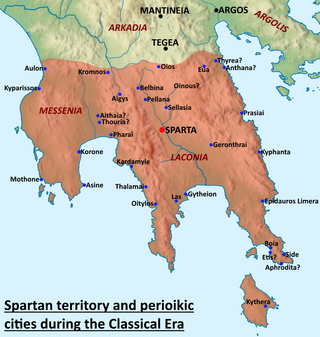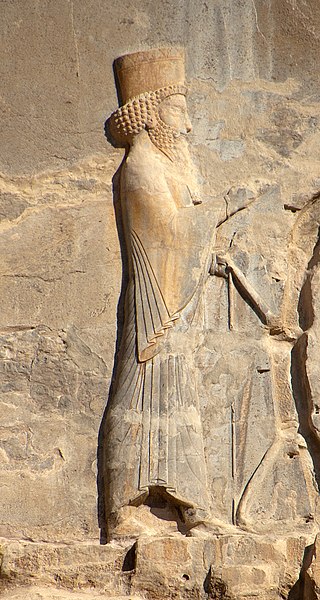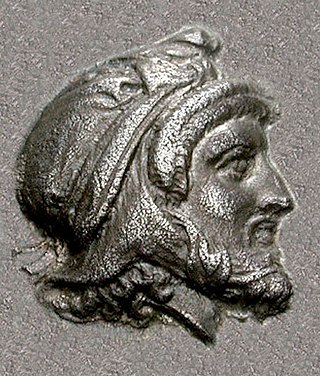
Sparta was a prominent city-state in Laconia in ancient Greece. In antiquity, the city-state was known as Lacedaemon, while the name Sparta referred to its main settlement on the banks of the Eurotas River in the Eurotas valley of Laconia, in south-eastern Peloponnese. Around 650 BC, it rose to become the dominant military land-power in ancient Greece.
This article concerns the period 519 BC – 510 BC.

Tissaphernes was a Persian commander and statesman, Satrap of Lydia and Ionia. His life is mostly known from the works of Thucydides and Xenophon. According to Ctesias, he was the son of Hidarnes III and therefore, the great grandson of Hydarnes, one of the six conspirators who had supported the rise of Darius the Great.
Lycurgus or Lykourgos is the legendary lawgiver of ancient Sparta.
In Greek legends, Procles was one of the Heracleidae, a great-great-great-grandson of Heracles, and a son of Aristodemus and Argia. His twin was Eurysthenes. Together they received the land of Lacedaemon after Cresphontes, Temenus and Aristodemus defeated Tisamenus, the last Achaean king of the Peloponnesus. Procles married Anaxandra, daughter of Thersander, King of Kleonoe, sister of his sister-in-law Lathria, and was the father of Soos and the grandfather of Eurypon, founder of the Eurypontid dynasty of the Kings of Sparta.

Arses, known by his regnal name Artaxerxes II, was King of Kings of the Achaemenid Empire from 405/4 BC to 358 BC. He was the son and successor of Darius II and his mother was Parysatis.

Leonidas I was king of the Ancient Greek city-state of Sparta. He was the son of king Anaxandridas II and the 17th king of the Agiad dynasty, a Spartan royal house which claimed descent from the mythical demigod Heracles. Leonidas I ascended to the throne in c. 489 BC, succeeding his half-brother king Cleomenes I. He ruled jointly along with king Leotychidas until his death in 480 BC, when he was succeeded by his son, Pleistarchus.

Pharnabazus II was a Persian soldier and statesman, and Satrap of Hellespontine Phrygia. He was the son of Pharnaces II of Phrygia and grandson of Pharnabazus I, and great-grandson of Artabazus I. He and his male ancestors, forming the Pharnacid dynasty, had governed the satrapy of Hellespontine Phrygia from its headquarters at Dascylium since 478 BC. He married Apama, daughter of Artaxerxes II of Persia, and their son Artabazus also became a satrap of Phrygia. According to some accounts, his granddaughter Barsine may have become Alexander the Great's concubine.

Pausanias was a Spartan regent and a general. In 479 BC, as a leader of the Hellenic League's combined land forces, he won a pivotal victory against the Achaemenid Empire in the Battle of Plataea. Despite his role in ending the Second Persian invasion of Greece, Pausanias subsequently fell under suspicion of conspiring with the Persian king Xerxes I. After an interval of repeated arrests and debates about his guilt, he was starved to death by his fellow Spartans. What is known of his life is largely according to Thucydides' History of the Peloponnesian War, Diodorus' Bibliotheca historica and a handful of other classical sources.

Demaratus was a king of Sparta from around 515 BC to 491 BC. He was the 15th ruler of the Eurypontid dynasty and the firstborn son of King Ariston. During his reign, Demaratus is best known for his opposition to his co-ruler, King Cleomenes I of the Agiad dynasty. This rivalry ultimately led to his dethronement around 491 BC, following Cleomenes' accusations of illegitimacy and political maneuvering.
Agis I was a king of Sparta and eponym of the Agiad dynasty. He was possibly the first historical king of Sparta, reigning at the end of the tenth century BC, during the emergence of the Dorians in Laconia. He is said by most ancient authors to have conquered the region and enslaved the helots.

300 is a 2006 American epic historical action film directed by Zack Snyder, who co-wrote the screenplay with Kurt Johnstad and Michael B. Gordon, based on the 1998 comic book limited series of the same name by Frank Miller and Lynn Varley. The film, like its source material, is a fictionalized retelling of the Battle of Thermopylae in the Greco-Persian Wars. The plot revolves around King Leonidas, who leads 300 Spartans into battle against the Persian "God-King" Xerxes and his invading army of more than 300,000 soldiers. As the battle rages, Queen Gorgo attempts to rally support in Sparta for her husband. The film also features Michael Fassbender in his film debut.
Eurypon, otherwise called Eurytion, son of Soos and grandson of Procles, was the third king of that house at Sparta, and thenceforward gave it the name of Eurypontidae.

The Agiad dynasty was one of the two royal families of the Ancient Greek city-state of Sparta. They ruled jointly along with the Eurypontid dynasty, possibly from the 8th century BC onwards, being the senior of the two houses. The hypothetical founder of the dynasty was Agis I, possibly the first king of Sparta at the end of the 10th century BC, who subsequently gave his name to the dynasty. The two lines, who maintained an enduring rivalry, were, according to tradition, respectively descended from the twins Eurysthenes and Procles, both descendants of Heracles. The most famous member of the Agiad dynasty was Leonidas I, known for his heroic death at the Battle of Thermopylae in 480 BC. The last Agiad king was Agesipolis III, deposed by the Eurypontid Lycurgus in 215 BC.
Soos was a fictional king of Sparta, created in the 4th century BC in order to harmonise the list of the two Spartan dynasties. Various deeds were also attached to his reign, dated by ancient authors to the 11th century BC.

Kim Soo-hyun is a South Korean actor. One of the highest-paid actors in South Korea in 2020, his accolades include five Baeksang Arts Awards, two Grand Bell Awards and one Blue Dragon Film Award. From 2012 to 2016, in 2021 and 2022, he has appeared in Forbes Korea Power Celebrity 40 list. He was selected as Gallup Korea's Television Actor of the Year in 2014 and was featured by Forbes in their 30 Under 30 Asia list of 2016.

Kim Soo-mi was a South Korean actress. She had a prolific career in film and television. She debuted in a talent contest in 1970, then shot to fame in Country Diaries. The landmark TV series aired for almost 20 years, making her one of the most popular Korean actresses of the 1980s.










